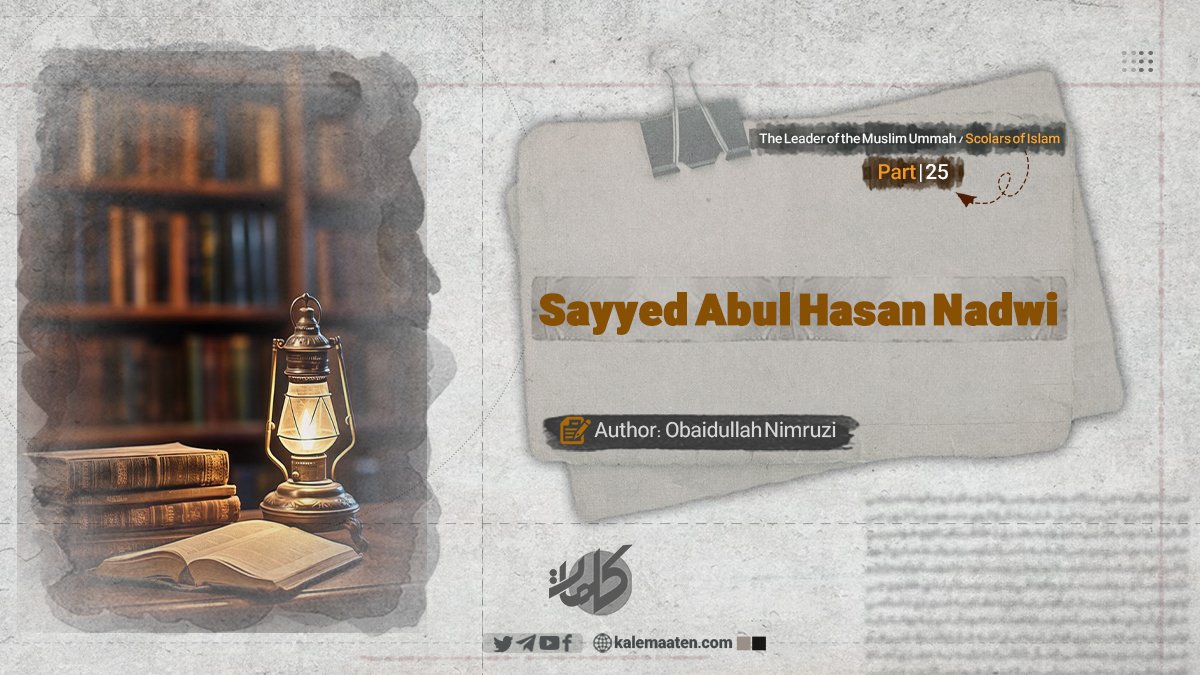
Author: Obaidullah Nimruzi
Allama Sayyed Abul Hasan Nadwi, ‘May Allah Have Mercy on Him’ (Part 25)
To the Capital of Sultan Mahmud of Ghazni
Due to time constraints and a packed schedule, my visit to Afghanistan was brief and limited to exploring institutions, figures, and cultural centers in Kabul and its surroundings. I requested permission from the Minister of Education and his deputy to travel to the city of Ghazni, the “Alexandria of Islam,” and home of Sultan Mahmud the Mujahid, the founder of the Islamic state who hoisted the Islamic flag in India.
Ghazni is a city where a new chapter of civilization, sciences, literature, and poetry was written. Just as Cordoba and Granada flourished in the early 5th century in the West, Ghazni shone in the late 4th and early 5th century AH. I knew my journey to Afghanistan would be incomplete if I could not visit this city. The spirit and essence of Ghazni lie more in its ruins, relics, and tales than in its modern buildings, markets, and urban infrastructure. Returning to my country without seeing the city of Mahmud Ghaznavi and Hakim Sanai would have left a sense of longing and regret within me. Fortunately, the Minister of Education welcomed my suggestion, and his deputy instructed the governor and head of education in Ghazni to greet our group and assemble experts and staff to assist us in visiting the city’s historical sites and landmarks.
The Legacy of Civilization and Knowledge in Ghazni
On the morning of Saturday, June 9, we departed for Ghazni, about 138 kilometers from Kabul. We were warmly welcomed in the city by the mayor and some officials from the Ministry of Education, who assigned guides and staff from the Department of Antiquities to accompany us. We immediately set off to the old city located east of the new city. After Baghdad, the Abode of Peace, Ghazni was the capital of the Islamic world during the Ghaznavid era, a center of civilization and enlightenment, and a city of great prosperity. Today, however, it lies mostly in ruins. Just as a magnet draws iron filings and a market displays new wares, Ghazni once attracted intellectuals, literary geniuses, skilled artisans, expert architects, great poets, scholars, devout ascetics, mystics, eloquent speakers, leaders, conquerors, physicians, philosophers, and mathematicians during the Ghaznavid era. And like rivers and small streams flowing towards the sea, rare and precious treasures from conquered lands poured into Ghazni.
Figures like the poet and literary scholar Badi’ al-Zaman al-Hamadani, the scientist and mathematician Al-Biruni, the immortal Persian poet Ferdowsi, and other Persian poets such as Asjadi, Unsuri, Asadi, Ghazari, Farrokhi, and Manuchehri shared a close bond with Ghazni and were its loyal companions. Sultan Mahmud Ghaznavi himself supported and nurtured around 400 poets.
The Tragic Event of Ghazni’s Destruction
Ghazni reached the height of civilization and splendor for a century, leaving its mark and legacy. However, it fell prey to the ambitions and greed of the Ghurid dynasty, a family recently headed by the warrior-king Shahab-ud-Din Ghuri. One member of this family, Ala-ud-Din Husayn bin Hasan, bore a grudge against Bahram Shah, the ruler of Ghazni, who had executed his brother. Ala-ud-Din invaded Ghazni, plundering it for three days and nights, setting it ablaze, and reducing it to ashes. Everything perished in the flames, leaving the city in ruins. This event occurred in 547 AH, and Ala-ud-Din became infamous in history with the title “Jahansuz” (World Burner). As Allah has beautifully said: «إِنَّ الْأَرْضَ لِلَّهِ يُورِثُهَا مَنْ يَشَاءُ» “…Surely, the earth belongs to Allah; He gives it to whomever of His servants He wills.”
Walking among these ruins, we murmured the verses of Al-Ma’arri:
خفف الوطا ما اظن ادیم الارض
الا من هذه الاجســـاد
و قـــبیح بنـــا و ان قـــدم العهــد
هوان الاباء والاجداد
سر ان استطعت فی الهواء رویداً
لا اختیالاً علی رفات العباد
“Walk lightly, for the surface of the earth is covered with bodies. It is not fitting for us to look down upon the ancestors, even though their time has passed. If you can, move gently in the heavens, not with pride and arrogance over the remains of the servants of Allah.”
Through extensive excavations, remains of structures dating back to the time of Mas’ud ibn Muhammad and afterwards have been uncovered. Experts informed me that these excavations have been ongoing for ten years, revealing many signs and artifacts of the ancient, buried city and its civilization.
Continues…


